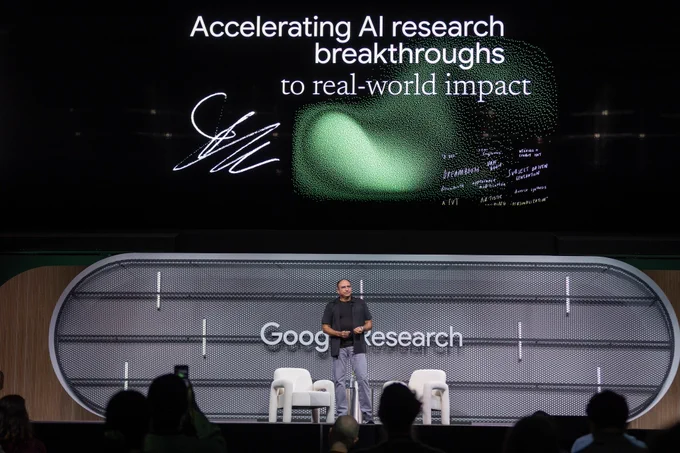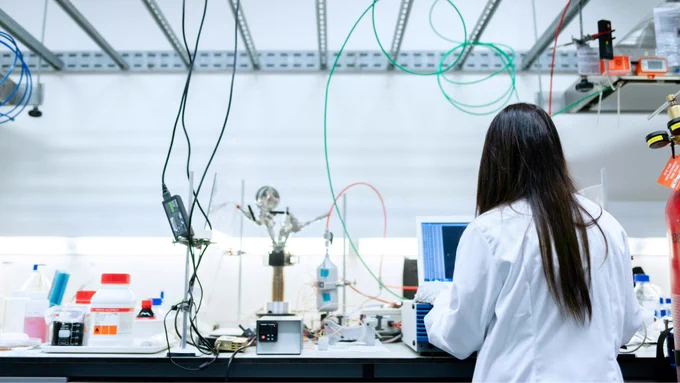VP Google. Head of Google Research. AI, science, foundations, search, climate, health, edu, arts, genai, algorithms. systems, innovation & combination thereof
Google
Joined May 2009
- Tweets 1,033
- Following 932
- Followers 2,977
- Likes 2,819
NL provides a framework for multi-time scale updates, allowing different components of the model to adjust at different frequencies.
To advance foundational AI, we must solve continual learning and catastrophic forgetting. New research by our team introduces Nested Learning (NL), a paradigm that views an ML model as a system of nested optimization problems.
This approach unifies architecture and optimization, creating a deeper computational capacity for learning. This is a crucial step toward creating models with the continual learning abilities seen in the human brain.
More in the blog by Vahab Mirrokni and Ali Behrouz: goo.gle/47IOCjP
Read the NeurIPS 2025 paper: abehrouz.github.io/files/NL.…
Yossi Matias retweeted
One of your top requests is here:
Gemini Deep Research now connects directly to your Gmail, Drive, Docs, and Chat.
Available for all users on desktop now (mobile soon)
Two common ways people are using it:
* Market analysis combining live web trends with your team's internal docs
* Competitor reports cross-referencing public data with your private strategy sheets & emails
Let us know how it goes, enjoy!
Today, we introduce our position paper “AI and the Future of Learning”, outlining Google’s approach to building AI to help improve learning outcomes for everyone.
The core focus at Google Research is driving breakthrough research and bridging fundamental scientific advancement into tangible solutions that address critical global needs. This is the magic cycle of research in action. Our strategy is deeply grounded in pedagogical principles and the very best of learning science.
Google is actively developing AI models like Gemini, guided by our LearnLM efforts, to create deeply personalized teaching and tutoring experiences at scale.
We aim to empower educators by giving them an AI teaching assistant to free up time for mentoring and connection.
We recognize the imperative to confront risks like "metacognitive laziness," ensuring tools promote critical thinking and accelerate human potential.
We remain committed to continuous collaboration with experts and an evidence-based approach.
Read the full report: services.google.com/fh/files…
Blog announcement: blog.google/outreach-initiat…
Yossi Matias retweeted
Our 7th gen TPU Ironwood is coming to GA!
It’s our most powerful TPU yet: 10X peak performance improvement vs. TPU v5p, and more than 4X better performance per chip for both training + inference workloads vs. TPU v6e (Trillium). We use TPUs to train + serve our own frontier models, including Gemini, and we’re excited to make the latest generation available to @googlecloud customers.
Yossi Matias retweeted
Our TPUs are headed to space!
Inspired by our history of moonshots, from quantum computing to autonomous driving, Project Suncatcher is exploring how we could one day build scalable ML compute systems in space, harnessing more of the sun’s power (which emits more power than 100 trillion times humanity’s total electricity production).
Like any moonshot, it’s going to require us to solve a lot of complex engineering challenges. Early research shows our Trillium-generation TPUs (our tensor processing units, purpose-built for AI) survived without damage when tested in a particle accelerator to simulate low-earth orbit levels of radiation. However, significant challenges still remain like thermal management and on-orbit system reliability.
More testing and breakthroughs will be needed as we count down to launch two prototype satellites with @planet by early 2027, our next milestone of many. Excited for us to be a part of all the innovation happening in (this) space!
Other relevant links:
Floods paper: nature.com/articles/s41586-0…
Nowcasting preprint: arxiv.org/abs/2510.13050
Flood forecasting blog: blog.google/technology/ai/ex…
Weather forecasting with WeatherNext: : deepmind.google/science/weat…
Floods Anticipatory Program in Nigeria: unocha.org/publications/repo…
Floods Anticipatory Action Program led by GiveDirectly: givedirectly.org/flood-forec…
Flood Forecasting interview by UNDRR: piped.video/watch?v=RfzZN7lL…
Scaling climate resilience requires public-private partnership. As the World Meteorological Organization (@WMO) rightly shared: public private cooperation is a win-win for the world and has the potential to improve the lives of billions of people, and to contribute to the Early Warnings for All initiative. At Google Research, we are deeply committed to this mission, focused on how AI can advance the state of the art and deliver powerful new tools.
I was attending the WMO Investor Forum in Geneva - a key gathering of leaders from the public, private sectors and philanthropic organizations to accelerate climate resilience investment.
Our research and platforms that are based on this research, are directly supporting WMO Members. We are partnering on AI for flood forecasting in countries including the Czech Republic, Nigeria, Uruguay, and Vietnam, and supporting the US National Hurricane Center.
This collaboration with the public sector is essential. We continue to build tools like Earth AI to deepen understanding, moving toward a world where no one is surprised by a natural disaster coming their way.
Pictures by Marc Bader
More in press release: wmo.int/news/media-centre/wm…
About Earth AI: blog.google/technology/resea…
Public news back in June: wmo.int/media/news/wmo-embra…
The shift to on-device AI requires a higher privacy bar. We're introducing Provably Private Insights (PPI) to enable essential developer analysis of GenAI features with a verifiable guarantee that raw user data is never exposed. This system is a core component of building AI responsibly.
PPI uses an open-source Gemma LLM inside a Trusted Execution Environment (Confidential Federated Analytics) to categorize unstructured data and derive insights. Only aggregated, differentially private statistics leave the secure environment. We've released the code to allow external verification of the end-to-end privacy guarantees.
Read more about its deployment in Recorder and our blueprint by Artem Lagzdin and Daniel Ramage: goo.gle/47De8XV
Preprint: arxiv.org/abs/2510.21684
StreetReaderAI leverages context-aware AI to solve a critical accessibility barrier, making immersive street-level imagery interpretable by screen readers. This work is the path to fully inclusive digital exploration.
Introducing StreetReaderAI: A new and more accessible street-level imagery prototype using context-aware, real-time AI and accessible navigation controls. We're redefining immersive streetscape experiences to be inclusive for all with multimodal AI. More: goo.gle/4oq1J0o
The AI-powered Fitbit Personal Health Coach, built with Gemini models, is now rolling out in public preview.
The system uses a multi-agent framework and leverages advanced capabilities, similar to PH-LLM, to perform numerical reasoning on physiological data (sleep, activity, etc.). This architecture is key to delivering proactive, tailored guidance that adapts to the user's real-time metrics.
Building trustworthy AI in health requires rigor. The coach is grounded in scientific frameworks, guided by the Consumer Health Advisory Panel among others, and continuously validated using the SHARP evaluation framework for safety and accuracy. This sets the standard for responsible deployment.
Read more on the research behind building the personal health coach in the bog by Shwetak Patel and Florence Thng: goo.gle/4hR1pWp
Fitbit public preview announcement by Andy Abramson: blog.google/products/fitbit/…
Featured Notebooks with the NotebookLM team help transform complex Google Research work—such as the findings from a decade of genomics research—into an interactive and accessible format . This is key to broadening engagement with scientific discovery. Looking forward to more Google Research Featured notebooks going live soon!
We're partnering with @GoogleResearch to kick off a new series of Featured Notebooks exploring topics ranging from health to science to (of course) AI.
Starting with "How do scientists link genetics to health" this notebook explores some of what we've learned over the past 10 years of genomic research:
notebooklm.google.com/notebo…
Concluding Research@ feeling optimistic about the future of AI and science. The breakthroughs shared show how our research is addressing society’s most pressing challenges. Thank you to everyone who contributed and participated in this event.
Among the presentations by our team members, Annalisa described AI co-scientist, our multi-agent system built on Gemini to accelerate scientific discovery. The system is designed to augment human scientists, focusing on novel hypotheses generation that would accelerate scientific breakthroughs.
The multi-agent AI system (employing Generation, Reflection, Ranking and Evolution agents) has three key attributes: simulation of scientific debate between pairwise combinations of generated hypotheses, test-time compute scaling to improve outputs, and an internal auto-evaluation metric.
Research collaboration with academic partners confirms its potential for drug repurposing for Acute Myeloid Leukemia, and for insights related to Liver Fibrosis.
More in earlier blog about AI co-scientist: research.google/blog/acceler…
What a compelling conversation with James and Hartmut on the future of Quantum AI. Our team's overarching goal is building top-quality quantum computing hardware and software for meaningful applications.
The key step discussed was demonstrating the first-ever verifiable quantum advantage on the Willow chip. This breakthrough moves us much closer to quantum computers that can drive major discoveries in areas like medicine and materials science.
Now, we’re focused on achieving Milestone 3 on our quantum hardware roadmap, a long-lived logical qubit.
Had a pleasure to engage in fireside chat with @Kantrowitz on the evolving role of AI in research and its pathway to tangible impact. We discussed the acceleration of breakthrough science, exemplified by our AI model's generation and validation of a novel cancer hypothesis in living cells.
The “magic cycle” between breakthrough research and real-world impact is accelerating, yielding helpful technologies quicker than ever. This shift is positioning AI not as a replacement, but as a co-scientist, which will ultimately lead to more, empowers researchers and scientists dedicated to solving grand challenges in health, climate and other areas. AI also empowers healthcare workers, teachers, and professionals, and overall AI can amplify human ingenuity.
More about our talk: bigtechnology.com/p/google-r…
At the kick off Keynote I shared the three recent highlights:
- Fighting Cancer with AI: DeepSomatic accurately identified ten genetic variants in leukemia previously missed by other tools. Separately, the C2S-Scale 27B model generated a validated hypothesis for a novel combination cancer therapy.
- Verifiable Quantum Advantage: The Quantum Echoes algorithm achieved the first-ever verifiable quantum advantage on our Willow chip, demonstrating a 13,000x speedup over comparable classical supercomputing, a step closer to practical applications of quantum computing.
- Understanding Earth: Earth AI initiative will synthesize diverse geospatial data and models to enable geospatial reasoning, making complex crisis response, complex logistics planning and planetary science questions answerable.
Was honored to host Research@ our Mountain View HQ last week.
Over the past two weeks, we've seen a flurry of new results from Google Research, from genomics to quantum computing to geospatial understanding.
Research is our chance—and imperative—to improve day-to-day lives, and address societal challenges and opportunities, and it means that research and innovation is never 'done.' A couple of highlights from Research@ event in this thread👇
Yossi Matias retweeted
🎉 We're excited to announce the 2025 Google PhD Fellows! @GoogleOrg is providing over $10 million to support 255 PhD students across 35 countries, fostering the next generation of research talent to strengthen the global scientific landscape. Read more: goo.gle/43wJWw8




























